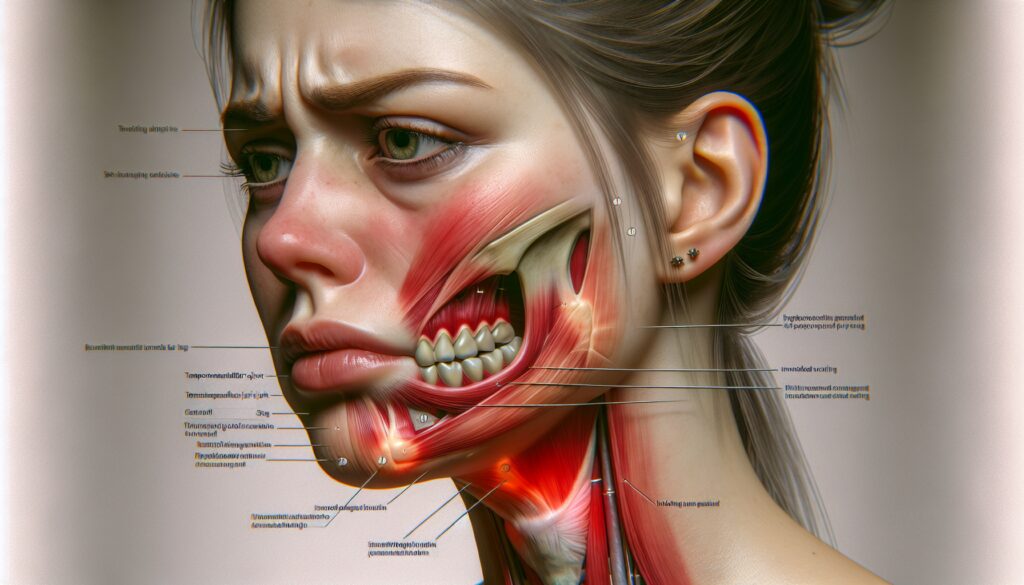
Understanding temporomandibular joint (TMJ) disorders

The temporomandibular joint (TMJ) is an integral part of our body's anatomy, allowing us to speak, chew, and yawn. However, when disorders affect this joint, the resulting pain and discomfort can be a significant hindrance to everyday activities. Understanding the nature of these disorders, their causes, symptoms, as well as the available treatment options, is essential for those seeking relief.
What Are the Temporomandibular Joints (TMJ)?
The temporomandibular joints are the joints that connect your jawbone to your skull, acting as a sliding hinge on each side of your head. These joints are supported by muscles and ligaments that allow for a wide range of motion, making them one of the most complex joints in the body.
When functioning correctly, the TMJ enables us to talk, chew, and express ourselves without pain. However, when disorders occur, it can lead to a cluster of issues known as temporomandibular joint disorders or TMD.
What Is Temporomandibular Disorder (TMD)?
Temporomandibular disorder refers to a range of conditions that cause discomfort and dysfunction in the TMJ and surrounding muscles. Although TMD is often used interchangeably with TMJ, TMD specifically refers to the disorder, while TMJ refers to the joint itself.
Individuals with TMD may experience difficulty in opening and closing the mouth, and the condition can lead to further health problems if not treated properly.
Temporomandibular Joint (TMJ) Disorders are complex and can stem from various factors, including jaw injury, genetics, and arthritis. Stress and habitual teeth grinding can also contribute to the development of TMD.
What Causes TMJ Disorders?
Causes of temporomandibular joint disorders can be multifactorial. They often stem from issues within the joint itself or surrounding muscles. Some common causes include:
- Jaw trauma or injury
- Arthritis in the joint
- Chronic clenching or grinding of teeth (bruxism)
- Alignment issues or dislocation of the disk within the joint
Identifying the root cause of TMJ disorders is crucial for effective treatment and management.
What Are the Signs and Symptoms of TMJ Disorders?
Recognizing the signs and symptoms of TMJ disorders is the first step in seeking appropriate care. Common symptoms include:
- Jaw pain or tenderness
- Aching pain in and around your ear
- Difficulty chewing or pain while chewing
- Aching facial pain
- Locking of the joint, making it difficult to open or close the mouth
Jaw pain relief is a primary concern for those suffering from TMJ disorders, as the symptoms can significantly impact daily life.
How Are TMJ Disorders Diagnosed?
Diagnosing temporomandibular joint dysfunction involves a thorough medical examination, which may include:
- A review of the patient's medical history
- A physical exam where the doctor will listen to and feel the jaw when opening and closing the mouth
- Imaging tests such as X-rays, CT scans, or MRIs to get a detailed view of the joint
Proper diagnosis is essential for formulating an effective treatment plan.
What Are the Treatments for TMJ Disorders?
TMJ treatment options vary based on the severity and cause of the disorder. Treatments range from conservative self-care practices to more invasive surgical options. Effective management of TMJ disorders may include:
- Medications such as pain relievers and anti-inflammatories
- Physical therapy exercises to strengthen and stretch the jaw muscles
- Oral splints or mouth guards
- Relaxation techniques to help control jaw tension
- In severe cases, surgical procedures might be considered
It is important to work closely with healthcare professionals to determine the best course of treatment for your specific situation.
What Is the Best Treatment for TMJ Disorder?
There is no one-size-fits-all treatment for TMJ disorder; it often requires a multi-disciplinary approach. The best treatment is a combination of medication, physical therapy, and lifestyle modifications. In certain cases, surgical interventions may be necessary.
It is essential to consult with a healthcare professional who can tailor a treatment plan to your needs, considering the specifics of your condition.
Can I Treat TMJ Myself?
While medical guidance is paramount, there are self-care strategies for TMJ that can alleviate symptoms. These include:
- Applying ice packs to reduce inflammation
- Eating soft foods to rest the jaw muscles
- Practicing stress-reduction techniques like mindfulness or yoga
However, it is crucial to seek professional advice before undertaking any self-treatment to avoid aggravating the condition.
Is TMJ a Lifelong Condition?
TMJ disorders vary in intensity and duration. Some individuals may experience temporary symptoms, while for others, it could be a chronic condition. Managing stress, practicing good jaw habits, and following a treatment plan can help reduce the likelihood of long-term issues.
What Is the Main Cause of TMJ?
The main cause of TMJ disorder is often multifaceted. It typically involves a combination of muscle strain, joint dysfunction, and sometimes systemic issues such as arthritis. It's important to note that factors like stress and jaw injury can exacerbate the condition.
Understanding the complexities of TMJ disorders and their treatments is crucial for those affected. Remember, each case is unique, and a personalized approach to treatment is often necessary. While the journey to managing TMJ disorders can be challenging, advancements in medical science and therapy offer hope for those seeking relief from this often debilitating condition.






Leave a Reply